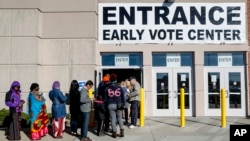Personnel from the U.S. Justice Department's civil rights division will be deployed to polling sites in 28 states to monitor Tuesday's election, five more than it monitored in the 2012 election, the department said on Monday.
Most of those states will receive Justice Department staff who have no statutory authority to access polling sites as a result of a 2013 Supreme Court decision that struck down parts of the Voting Rights Act, curtailing the department's ability to deploy election observers with unfettered access to the polls.
More than 500 Justice Department personnel will be deployed on Tuesday, compared to more than 780 personnel the department dispatched during the 2012 general election. A Justice Department spokesman declined to say how many of Tuesday's personnel will be full-access observers.
Voter fraud in U.S. is rare
Tuesday's hotly contested election, including the presidential race pitting Republican Donald Trump against Democrat Hillary Clinton, will be the first in decades in which the Justice Department can only send full-access observers to states where a federal court ruling has authorized it.
On the campaign trail, Trump has warned the election may be rigged and has called on supporters to keep an eye on voting activity for possible signs of fraud in large cities. Numerous studies have found that U.S. voter fraud is exceedingly rare.
"As always, our personnel will perform these duties impartially, with one goal in mind: to see to it that every eligible voter can participate in our elections to the full extent that federal law provides," said Attorney General Loretta Lynch in a statement.
Full-access observers
Courts have granted the Justice Department permission to deploy full-access observers in five states: Alaska, California, Louisiana, New York, and Alabama. But the court order for Alabama only pertains to municipal elections and it is not on the list of states where the Justice Department is deploying
poll watchers this year.
The Justice Department staff who are deployed to the other 24 states on Tuesday will be election "monitors", who must rely on local and state authorities to grant them access to polling locations.
"In most cases, voters on the ground will see very little practical difference between monitors and observers," said Vanita Gupta, the head of the department's civil rights division, in a statement.





